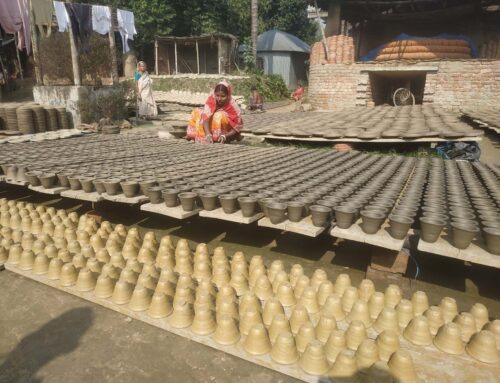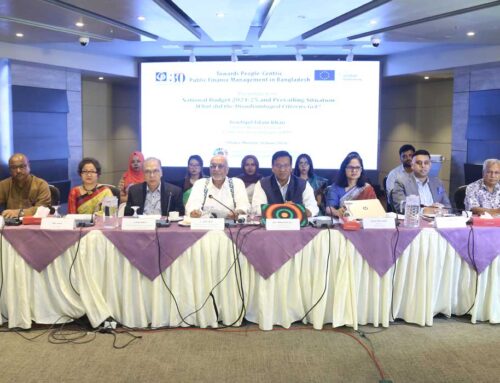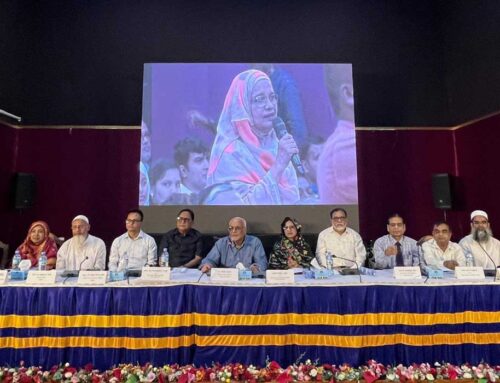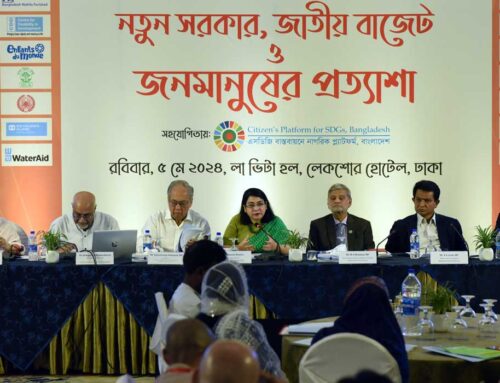
Flexibility in stimulus package conditionality is required; unemployment allowance urged
Citizen’s Platform for SDGs, Bangladesh conducted an online survey among young population to get a wider understanding about the youth agenda in COVID-19 situation. 67% of the respondents despite having need did not receive any support from either government or NGOs. Supports from government for youths are not adequate according to the perception of the survey respondents. 28 percent youths, aged above 18, left studies to support their families amid the Covid-19 pandemic in the country, according to the survey.
These findings were presented at a virtual dialogue on COVID-19 and Bangladesh: A Youth Agenda for Recovery, organised by the Citizen’s Platform in partnership with United Nations Development Programme (UNDP), ActionAid Bangladesh, Friedrich-Ebert-Stiftung (FES) Bangladesh, Plan International Bangladesh, WaterAid Bangladesh and Centre for policy Dialogue (CPD).The event was held virtually on Sunday, 1 November 2020. The dialogue primarily focused on the digital divide, education and skills, and employment-related challenges of heterogeneous youth groups in Bangladesh in face of the ongoing COVID-19 pandemic.
Ms Tamara-E-Tabassum, Programme Associate, CPD presented the survey findings as the keynote presenter. According to the youth survey, almost 80% of the respondents reported about significant reduction in income of their households which adversely affected the education of the youth, particularly female students. Almost half of the respondents reported about not having digital devices and have limited access to digitised system of education and employment. 70% respondents reported that monthly unemployment benefit of around Tk 5,000 per month is necessary.
Mr Mahmud Hasan, Project Officer, Governance Cluster, United Nations Development Programme (UNDP) mentioned that SME and youth entrepreneur were considered to be a potential cohort for the economy of Bangladesh. He fears that, in Bangladesh, 28.5 million people may lose their jobs.
In this pandemic situation, people are joining in short term livelihood to tackle the financial needs. The post pandemic situation will not be in favor for those who are not practically trained or skilled, stated by Mr Riaj Uddin Badsha, Graduate in Diploma Engineering (Mechanical Technology), UCEP Bangladesh.
Mr Md Hasan Ali, President, Bangladesh Textile and Garment Workers League (BTGWL) said that around 85% garments workers are from youth cohort and women are major part of it. This huge group is at the risk of losing jobs and some portion of them already lost it due to the pandemic.
Ms Sanjana Islam, Activist, Action Aid Bangladesh and Founder, Humanitarian Aid talked about how young entrepreneurs face constraints in getting government loans. Eligibility criteria like having a trade license of 3 years or older, are obstacles that young and new entrepreneurs face.
Ms Keya Akhter, Entrepreneur, Care Beauty Parlour said that COVID-19 caused serious risk in running businesses in her sector. They might not be able to cope up with the loss in the long run and urged for government attention in this regard.
Mx Rani Chowdhury, a youth representative from the third gender community; Ms Anika Bushra, Central youth volunteer of Y-moves project, YES BD; Mr Manjuni Chakma, Project officer, Kapaeeng Foundation, a youth representative from indigenous community; Mr Talha Rahman, Technical Officer, ADD International; and Ms Nupur Rani, a youth representative from Dalit community also spoke at the event.
While delivering the Special Remarks, Dr Debapriya Bhattacharya, Convenor, Citizen’s Platform and Distinguished Fellow, CPD stated that the unemployment allowance needs consideration in the next national budget as part of the COVID-19 response.
Professor Mustafizur Rahman, Distinguished Fellow, CPD opined that the policy makers should address concerns over skill gap, finance access gap, rural-urban gap and gender gap.
Mr Towfiqul Islam Khan, Senior Research Fellow, CPD, chaired the virtual discussion.
The discussion session was attended by a wide group of young stakeholders including labour leaders, private sector entrepreneurs, persons who are persons with disability, Dalit, indigenous community and third gender.





